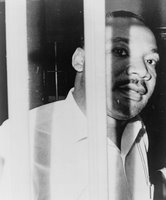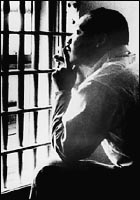Open up a window; it’s getting all racial up in this piece.
 Today this country celebrates Martin Luther King Day. It also happens to be the 78th anniversary of his birth.
Today this country celebrates Martin Luther King Day. It also happens to be the 78th anniversary of his birth.While the man was not a saint in the sense of personal righteousness, his life was an important one, as was his message.
He is most widely known for his "I Have a Dream" speech, but one piece that has always resonated with me is the letter he wrote to his fellow clergy while in jail on April 16, 1963. It is known as his Letter from Birmingham Jail.
When I have taught church history in a seminary class I have read the portions that you find below (the full text may be found here). I read it then and I read it now as it reminds me of the lack of effort on the part of the leadership of Christ's church, in the past and now.
I share it now (emphasis mine) because it has been my contention that segregation was bad AND that segregation is bad, particularly church segregation.
As I read it again I also wonder about the need to do more not only with regard to church desegregation, but also with regard to abortion. Is there not more we could/should do to speak up for those who cannot speak for themselves (Prov 31:8), to help those who are staggering to the slaughter (Prov 24:11)?
MY DEAR FELLOW CLERGYMEN:
While confined here in the Birmingham city jail, I came across your recent statement calling my present activities "unwise and untimely." Seldom do I pause to answer criticism of my work and ideas. If I sought to answer all the criticisms that cross my desk, my secretaries would have little time for anything other than such correspondence in the course of the day, and I would have no time for constructive work. But since I feel that you are men of genuine good will and that your criticisms are sincerely set forth, I want to try to answer your statements in what I hope will be patient and reasonable terms.
...
For years now I have heard the word "Wait!" It rings in the ear of every Negro with piercing familiarity. This "Wait" has almost always meant 'Never." We must come to see, with one of our distinguished jurists, that "justice too long delayed is justice denied."
We have waited for more than 340 years for our constitutional and God-given rights. The nations of Asia and Africa are moving with jetlike speed toward gaining political independence, but we stiff creep at horse-and-buggy pace toward gaining a cup of coffee at a lunch counter. Perhaps it is easy for those who have never felt the stinging dark of segregation to say, "Wait." But when you have seen vicious mobs lynch your mothers and fathers at will and drown your sisters and brothers at whim; when you have seen hate-filled policemen curse, kick and even kill your black brothers and sisters; when you see the vast majority of your twenty million Negro brothers smothering in an airtight cage of poverty in the midst of an affluent society; when you suddenly find your tongue twisted and your speech stammering as you seek to explain to your six-year-old daughter why she can't go to the public amusement park that has just been advertised on television, and see tears welling up in her eyes when she is told that Funtown is closed to colored children, and see ominous clouds of inferiority beginning to form in her little mental sky, and see her beginning to distort her personality by developing an unconscious bitterness toward white people; when you have to concoct an answer for a five-year-old son who is asking: "Daddy, why do white people treat colored people so mean?"; when you take a cross-county drive and find it necessary to sleep night after night in the uncomfortable corners of your automobile because no motel will accept you; when you are humiliated day in and day out by nagging signs reading "white" and "colored"; when your first name becomes "nigger," your middle name becomes "boy" (however old you are) and your last name becomes "John," and your wife and mother are never given the respected title "Mrs."; when you are harried by day and haunted by night by the fact that you are a Negro, living constantly at tiptoe stance, never quite knowing what to expect next, and are plagued with inner fears and outer resentments; when you no forever fighting a degenerating sense of "nobodiness" then you will understand why we find it difficult to wait. There comes a time when the cup of endurance runs over, and men are no longer willing to be plunged into the abyss of despair. I hope, sirs, you can understand our legitimate and unavoidable impatience.
You express a great deal of anxiety over our willingness to break laws. This is certainly a legitimate concern. Since we so diligently urge people to obey the Supreme Court's decision of 1954 outlawing segregation in the public schools, at first glance it may seem rather paradoxical for us consciously to break laws. One may won ask: "How can you advocate breaking some laws and obeying others?" The answer lies in the fact that there fire two types of laws: just and unjust. I would be the Brat to advocate obeying just laws. One has not only a legal but a moral responsibility to obey just laws. Conversely, one has a moral responsibility to disobey unjust laws. I would agree with St. Augustine that "an unjust law is no law at all"
Now, what is the difference between the two? How does one determine whether a law is just or unjust? A just law is a man-made code that squares with the moral law or the law of God. An unjust law is a code that is out of harmony with the moral law. To put it in the terms of St. Thomas Aquinas: An unjust law is a human law that is not rooted in eternal law and natural law.
...
One who breaks an unjust law must do so openly, lovingly, and with a willingness to accept the penalty. I submit that an individual who breaks a law that conscience tells him is unjust and who willingly accepts the penalty of imprisonment in order to arouse the conscience of the community over its injustice, is in reality expressing the highest respect for law.
...
I hope this letter finds you strong in the faith. I also hope that circumstances will soon make it possible for me to meet each of you, not as an integrationist or a civil rights leader but as a fellow clergyman and a Christian brother. Let us all hope that the dark clouds of racial prejudice will soon pass away and
 the deep fog of misunderstanding will be lifted from our fear-drenched communities, and in some not too distant tomorrow the radiant stars of love and brotherhood will shine over our great nation with all their scintillating beauty.
the deep fog of misunderstanding will be lifted from our fear-drenched communities, and in some not too distant tomorrow the radiant stars of love and brotherhood will shine over our great nation with all their scintillating beauty.Yours for the cause of Peace and Brotherhood,
MARTIN LUTHER KING, JR.
Labels: desegregation



2 Comments:
Living in THE most segregated and also one of the poorest cities in the nation (Detroit), I wonder at how Dr. King's leadership on racial and economic issues might have changed things further, broader, deeper, if he'd lived longer. Pray that God would send someone else into our public life with the same moral authority, skilled voice, and personal courage. Thanks for the good post.
Great cause for supplication.
We've really not had anyone of Dr. King's caliber since.
"The Revd." Jesse Jackson tried to work his way to the forefront, but he's never had near the ethos or influence, partly due to some perceived shady practices.
Of course, the assumption is that God would have to raise up an African-American. That may be so, but I wonder how things might have gone had a Caucasion pastor took the baton and ran with it.
Suppose a denomination started integrating churches and not just with a "token" effort of putting a minority on a white church staff.
Are we to the point yet where a predominately white congregation would seriously consider a pastor who was African-American or Asian-American or Hispanic?
I think we all know the answer.
It's unfortunate that folks can defer to having pragmatism in their corner because the homogeneous principle is most effective in church growth.
Naturally, people like to be around those like themselves, particularly something as visible as skin color.
While it's somewhat in vogue (though it always has been to some degree) to decry the various denominations, with different churches for different theologies, I'm much more grieved and concerned about the various ethnic churches for the various ethnic groups in a city.
It started with Jew & Gentile having to learn to love in spite of their differences. It's a shame we've seen so little of it since.
Thanks for the insightful comments and you can take this cold weather back with you to Detroit!
Brrrr!
Post a Comment
<< Home